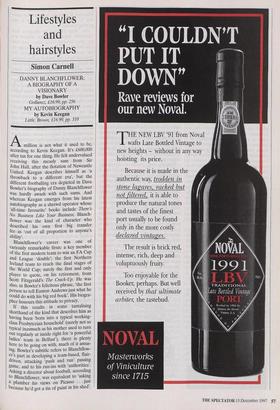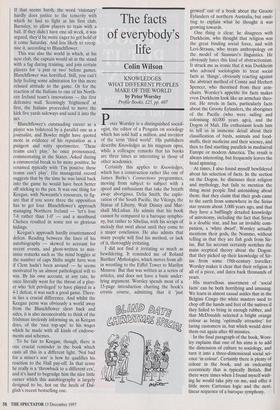Lifestyles and hairstyles
Simon Carnell
DANNY BLANCHFLOWER: A BIOGRAPHY OF A VISIONARY by Dave Bowler Gollancz, £16.99, pp. 256 MY AUTOBIOGRAPHY by Kevin Keegan Little, Brown, £16.99, pp. 310 Amillion is not what it used to be, according to Kevin Keegan. It's £600,000 after tax for one thing. He felt undervalued receiving this measly sum from Sir John Hall, after the .flotation of Newcastle United. Keegan describes himself as 'a throwback to a different era', but the different footballing era depicted in Dave Bowler's biography of Danny Blanchflower was hardly awash with such sums. And Whereas Keegan emerges from his latest autobiography as a shrewd operator whose all-time favourite' books include There's No Business Like Your Business, Blanch- flower was the kind of character who described his own first big transfer fee as 'out of all proportion to anyone's ability'.
Blanchflower's career was one of variously remarkable firsts: a key member of the first modem team to win an FA Cup and League 'double': the first Northern Ireland team to reach the final stages of the World Cup; surely the first and only Player to quote, on his retirement, from Scott Fitzgerald's The Crack-Up. He was also, in Bowler's felicitous phrase, 'the first person to tell Eamon Andrews just what he could do with his big red book'. His biogra- pher honours this attitude to privacy.
If this results in some tantalising Shorthand of the kind that describes him as having been 'born into a typical working- class Presbyterian household' (surely not so typical inasmuch as his mother used to turn out regularly at inside right for 'a powerful ladies' team in Belfast'), there is plenty here to be going on with, much of it amus- ing. Bowler's subtitle refers to Blanchflow- er's part in developing a team-based, flair- driven, attacking 'push and run' passing game, and to his run-ins with 'authorities'. Asking a director about football, according to Blanchflower, was equivalent to 'asking a plumber his views on Picasso . . . just because he'd got a tin a paint in his shed'. If that seems harsh, the word 'visionary' hardly does justice to the temerity with which he had to fight at his first club, Barnsley, to allow players to train with a ball. If they didn't have one all week, it was argued, they'd be more eager to get hold of it come Saturday. And less likely to recog- nise it, according to Blanchflower.
This was also the world in which, at his next club, the captain would sit in the stand with a fag during training, and join certain players for 'a pint or two' before games. Blanchflower was horrified. Still, you can't help feeling some admiration for this more relaxed attitude to the game. Or for the reaction of the Italians to one of his North- ern Ireland team's innovations — the first defensive wall. Seemingly 'frightened' at first, the Italians proceeded to move the kick five yards sideways and send it into the net.
Blanchflower's outstanding career as a player was bolstered by a parallel one as a journalist, and Bowler might have quoted more in evidence of his reputation as a pungent and witty sportswriter. 'These teams can't play,' he once pronounced, commentating in the States. Asked during a commercial break to be more positive, he resumed typically with 'I'm positive these teams can't play'. His managerial record suggests that by the time he was lured back into the game he would have been better off sticking to the pen. It was one thing for Keegan, with Newcastle's resources, to fig- ure that if you score three the opposition has to get four. Blanchflower's approach managing Northern Ireland — 'let's lose 7-6 rather than 1-0' — and a moribund Chelsea resulted in some not so glorious hidings.
Keegan's approach hardly countenanced defeat. Reading between the lines of his autobiography — skewed to account for recent events, and ghost-written to min- imise remarks such as 'the mind boggles at the number of caps Shifts might have won if Clem hadn't been around' — he seems motivated by an almost pathological will to win. By his own account, at any rate, he once literally went for the throat of a play- er who 'felt privileged' to have played in a 4-1 defeat, it was such a good game. There- in lies a crucial difference. And whilst the Keegan perm was obviously a world away from the Blanchflower short back and sides, it is also inconceivable to think of the Irishman tirelessly informing us, as Keegan does, of the 'nice top-ups' to his wages which he made with all kinds of endorse- ments and schemes.
To be fair to Keegan, though, there is one crucial reminder in the book which casts all this in a different light. 'Not bad for a miner's son' is how he qualifies his reaction to the Hall pay-off. In that sense he really is a 'throwback to a different era', and it's hard to begrudge him the nice little earner which this autobiography is largely designed to be, hot on the heels of Dal- glish's recent bestselling one.



















































































 Previous page
Previous page